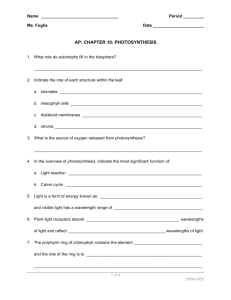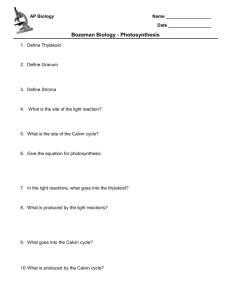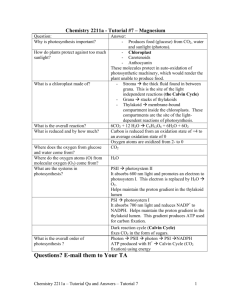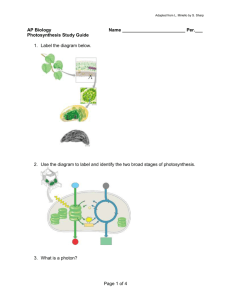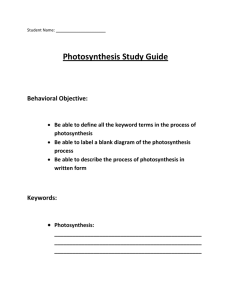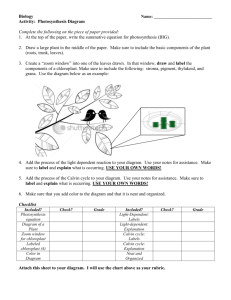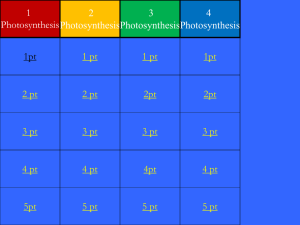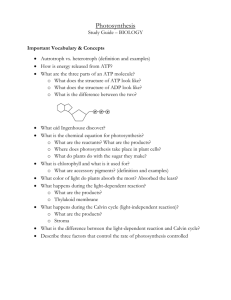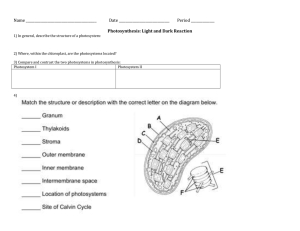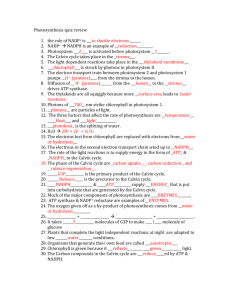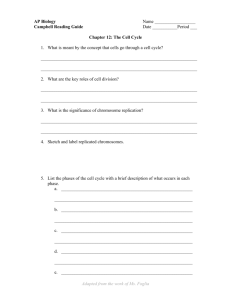f? - WEB . WHRSD . ORG
advertisement
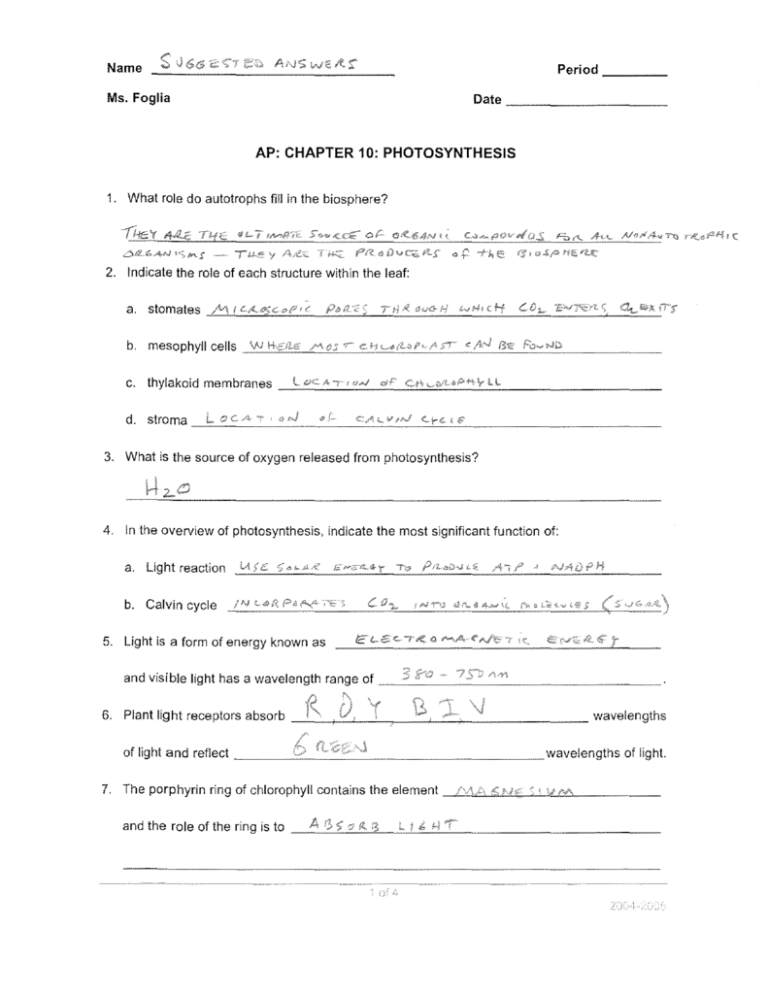
Name ~ u6G~cn:..t.~. Period Ms. Foglia Date _____________ AP: CHAPTER 10: PHOTOSYNTHESIS 1. What role do autotrophs fill in the biosphere? 1~Y 4AL~E~ E~n~~OTh J~c~r ~ /t~: O~ O’~64t4~t cO~dO~ Tic PZ.d ctjR~ øç #~t~ A~ N4~rn~ r~tA~fvc ti,E 2. Indicate the role of each structure within the leaf: a. stomates ,‘M fC.~coic( b. mesophylicells VU ~aicE Hxaxrc 7405 C LoCA~rf~I d. stroma rU OSCAr ~ c (ca?LAic 4 c. thylakoid membranes L ~ua-/4 y•~i~ c: C&~ZTTYZ.C Ct~ ct.cn crc CfrJ &~ cic CtLtaP+i%icL CALI’,?J Ci~c.tC 3. What is the source of oxygen released from photosynthesis? 4. In the overview of photosynthesis, indicate the most significant function of: a. Light reaction b. Calvin cycle ~ a~.,4/C i~’ ir~ ra~c~ ~ Ca~ 5. Lightis aformofenergyknownas CL and visible light has a wavelength range of 6. Plant light receptors absorb of light and reflect 5~ m f ~,4ns ~ AJAQPH ~.cic~*&S Ar r , “~1 wavelengths wavelengths of light. ~< 7. The porphyrin ring of chlorophyll contains the element andthe roleoftheringisto i4~r~ 7Gl~\A.C,cJb7 f?’ t) vic~~c ,ici? ~OA~ L ic Si its Name Ms. Foglia /: 8. What does chlorophyll do when excited by photons? ~A4 €~crcrcra.4 sc cs ~Ta aye ~ Seor~cr — 4 1 6 V ~E IL 9. Label the diagram and explain the difference between Photosystem I and Photosystem II, 14 + 74 a I a. 2 pc~n 1Oc~ ?cit.. Rg~cicj~/v~r~4~l Ur1~. C. ~ ~ .r ~ 10. With 2 different colored pencils, follow the energy paths of both noncyclic and cyclic electron flow in the diagram. II 74)71.4. ~ Energy for chemiosmotic Photosystem I synthesis of Phcto~syst.emU 0 LI I Name Ms. Foglia ______________________________ 11. How does cyclic differ from noncyclic photophosphorylation? C.ct 5,~I~ fstoc.51c44s 7441 Is 4yP 7cc L.)L c f~1Mc:PH t7~rs aicr ~ ~ ~ 12. To generate ATP, chloroplasts rely on the ETC to and AlP is synthesized when: V’~ L)icFv~61&iJ 13. /1 * 667t (t f2~q57cS 4 41 711 ‘40c/C/4 /477 Xr~rt’4cC /?hP41n;ccnasi,Lc) Within the thylakoid membrane and stroma, indicate what happens to each of the following: JA~r a water i3~ b. high energy electrons c. H+ D~ic ~4’4/0//.4t f. ADP fsc;~ ~74 6k c cArts 6 70 .5Pc%~-;+c~ 75 icrol/ I’ 14 Pc 11 beccrmc 14, Where in the chloroplast is the H+ concentration highest? 15. What happens during carbon fixation? IIT/74 ~ftjj~ /5 ,4.~ to 4 Oj A Ic’ ~ vcts so Pt~P14 ,&rC) IlOoP ~ 7440cr I7YZLU& &P 7c .7 &rrcrctc /7’TU d. oxygen ((CLE4cEL) e. NADP+ S 51 (/SLy 7474 I~ — .tci :1 jI. 7441 C C1~c74 L4SEO lAf ‘2~ 7A~7474k C/7Iul.2% /3~1 7~1444 c51~v,ci C~C.Ie 01 iS C..O~ 4,1cc ~t t...I 6~Y6/14: moLc1Cc.u cc /4./Cn~.r..55..Ci’ .:Ii~r 14 71/0444:, ,4,ciS 75cc. sT/ME 16. List the materials the plant uses during the Calvin cycle and the source of the materials. /37., N44’P4~ 14~~Ic/I Name Ms. Foglia ~jp 17. The products of the Calvin cycle are /440?, 40? 18. What environmental and internal challenges have forced both C4 and CAM plants to evolve alternatives to the photosynthesis system used by other plants? I/i 74 c~•• (445; 4 to a ~I 754 f/’vvtf:’jftr(,MTc ~j Ui c,.c4 4~ 515.5 Lcus 445j5/r~ ‘TOT ~ (i14 co~c~ ‘n 19, Why do high oxygen levels inhibit photosynthesis? ~cc4 Cvcr.0 4 (64v1 irJ 4rc’c ‘9~- l’o of: 7c:cC 20. What happens during photorespiration and why is it considered bad for plants? P}/IrCip1Ir,s4 I ‘~ 4jco Da7CC /1 GE&1Es117z5 /511.,.. 5155:/c ~ ,‘7c 4cr? ~sp I C /54. 15’ 5 ..:: 1’ ro,vCj74Er ~‘cc: CI ~6 It 111.71 •‘ 21. What evolutionary adaptations to the Calvin cycle are seen in C4 plants like sugar cane? UiL/ o 47 f’L.J’rr4 SC IN La? ~‘ S ji,.../s TI C/IL.. :J of C y rs,.c~ 4i1 .55551: .4 .4Isfl 4. 0:.., “ 1/~ 51 c..ccr /55C’ .55 5. (1~ ./SA.1.c~I~ /s 1.1 (55.15 ‘1L3~c:: 1’ ~ I: c 4j p45< C10.~c nC.s14) EL) 22. Draw a diagram to show the ([7 C~s~ / anatomical adaptations seen in C4 plants to accommodate their vanation on the Calvin cycle ~‘971.711 14 a \: Cc) 7 ~ — 71c’ct~r4 C4~c ~i14 23. What evolutionary adaptation to the Calvin cycle is see~3In CAM ~lants like cacti? C~’vr eLsofT~ J\J 5/ 9R.oftsoIl.L 4°f f[LC/OA71C 41 ~ o~ 14cr ~~7fI it’s •bV4t1 55155/N TFF515IJ~~’ / sifts-
